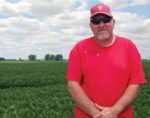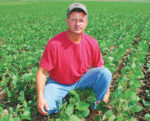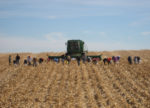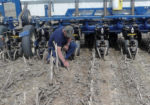Advertise Follow Us
Articles Tagged with ''no-tillers''
The quest for bigger yields and healthier plants led Ohio no-tiller David McNeilan to establish a twin-row system for corn and soybeans that takes advantage of higher populations and a quicker canopy.
Read More
New Rules May Open Door For Cover Crops
No-tillers who follow the NRCS’ new guidelines on termination dates can reap the benefits of covers without losing their crop insurance.
Read More
No-Till Notes
How No-Tillers Can Slam The Door On Crop Diseases
Crop rotation, seed selection and scouting are among the steps you can take to keep residue-laden no-till fields from harboring soilborne diseases that curtail yields.
Read More
Cover Crop Enthusiasm Helps No-Tiller Get More With Less
Spurred on by a payoff in soil quality and reduced inputs, Missouri no-tiller Bruce Bartlett is overcoming cover-crop challenges to improve his no-till system.
Read More
Getting More Effective, Cost-Efficient Lime Applications
Soil tests, choosing the right lime and understanding soil variability can help no-tillers achieve the right pH levels and boost crop growth.
Read More
Tips For Harvesting Downed Corn, And Dealing With The Aftermath
Downed corn can have a significant impact on profits and no-till systems, but here are tips and considerations to make the best of a bad situation.
Read More
Emerging Biologicals Could Help No-Tillers Get More With Less
Bio-ag products are outgrowing their “snake oil” reputation and could bring higher yields at a lower environmental price.
Read More
RTK Helps No-Tiller Tame Tough Corn Residue Challenges
Ohio no-tiller Don Denton finds precise guidance helps his soybean planter steer clear of corn stubble, save seed and improve soybean stands on his farm.
Read More











